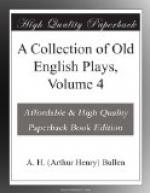[252] Old ed. “In on the scale.”
[253] Not marked in old ed.
[254] See note [85] in vol. II.
[255] I suspect that we should read “my humour,” and that the rest of the speech should be given to Flavia.
[256] The small bowl—the “Jack”—at which the players aimed in the game of bowls.
[257] Old ed. “Scil.”
[258] Old ed. “Sernulus.”
[259] An allusion to the Sententiae Pueriles of Dionysius Cato, a famous old school-book.
[260] Not marked in old ed.
[261] Old ed. “minited.”
[262] The first words of a charming song printed in Bateson’s Madrigals, 1604. Here is the song as I find it printed in the excellent collection of Rare Poems (1883) edited by my honoured friend, Mr. W.J. Linton:—
“Sister, awake! close
not your eyes!
The day its light
discloses:
And the bright Morning doth
arise
Out of her bed
of roses.
See! the clear Sun, the world’s
bright eye,
In at our window
peeping!
Lo, how he blusheth to espy
Us idle wenches
sleeping.
Therefore, awake, make haste,
I say,
And let us without
staying,
All in our gowns of green
so gay
Into the park
a-maying.”
[263] “A sort of game played with cards or dice. Silence seems to have been essential at it; whence its name. Used in later times as a kind of proverbial term for being silent.”—Nares.
[264] Embrace.
[265] Cf. Titus Andronicus, v. 1, “As true a dog as ever fought at head.” In bear-bating dogs were incited by the cry To head, to head! See my edition of Marlowe, iii. 241.
[266] Artery.
[267] The sword of Sir Bevis of Southampton; hence a general term for a sword.
[268] Lint applied to wounds.
[269] The mixture of muscadine and eggs was esteemed a powerful provocative.
[270] A corruption of Span. “buenos noches”—good night.
[271] Old ed. “Philantus.”
[272] Old ed. “earely.”
[273] Bellafront in Pt. II. of The Honest Whore, iv. 1, says— “I, though with face mask’d, could not scape the hem.”
[274] Old ed. “let.”
[275] Old form of pish.
[276] Guard = fringe. The coats of Fools were guarded.
[277] “Till death us depart”—so the form stood in the marriage-service; now modernised to “do part.”
[278] Quean.
[279] Not marked in old ed.
[280] Not marked in old ed.
[281] I have added the bracketed words; the sense requires them.
[282] A musical term.—“The running a simple strain into a great variety of shorter notes to the same modulation.”—Nares.
[283] Not marked in old ed.
[284] Old ed. “Ye faith.”




